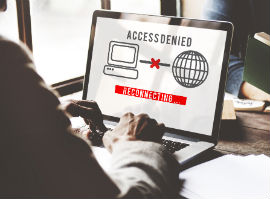After years of work and changes to the law, in 2016 an Australian court agreed to order the blocking of several pirate sites headed up by the infamous The Pirate Bay.
Since then, movie companies including Roadshow Films, Foxtel, Disney, Paramount, Columbia, and 20th Century Fox have returned to court many times to have more and more sites blocked. The strategy is also being deployed by the music industry, targeting regular streaming and download platforms as well as stream-ripping portals.
There has always been a question mark over how consumers will respond to blocking. The entertainment industries believe that it can only lead to more sales but hardcore pirates are less convinced. A new survey published by the Australian government now sheds a little more light on what happens when people are presented with “access denied” messages.
2020 Consumer Copyright Infringement Survey
Since 2015, the Australian Government Department of Infrastructure, Transport, Regional Development and Communications has commissioned annual surveys into users’ Internet activities. This includes the consumption of music, movies and TV shows, video games, and more recently, live sport. The latest Consumer Copyright Infringement Survey 2020 also provides detail on what happens when blocks are encountered.
The survey covers the habits of 2,421 Australian Internet users (aged 12+) in the three months preceding June 2020. During the period, the vast majority (76%) reported that no blocked sites had been encountered while 12% were unsure. The remaining 12% said that they had indeed faced ISP blocks and responded in various ways.
Responses to Facing an ISP Block of a Pirate Site
Interestingly, 59% said that rather than take any other action, they simply gave up trying to access the site/content they were looking for. Just over one in five (21%) said they sought alternative lawful access to content while 6% and 2% admitted to looking for free and paid pirate content respectively. Around 12% admitted to taking action to bypass the blockade.
However, when seeking to evade a website block, 47% of bypass-inclined users said they turned to VPNs, with just over a third (34%) turning to a proxy website. Just over a quarter (27%) said they utilized a search engine to find an alternative site, with 14% changing the network proxy in their browsers. The responses add up to more than 100% since some users utilized multiple techniques.
Those who had not faced a block in the previous three months were asked what they would do if they encountered one. A significant number (71%) said they would simply give up and 20% reported they would seek lawful access. Just 7% said they would attempt to bypass the block, with the majority (53%) suggesting search engines as a solution and 31% indicating they would use a VPN.
When comparing those who had sourced unlawful content in the previous three months to those who hadn’t, infringers were more likely than non-infringers to have encountered a block (21% versus 8%). However, infringers were much less likely to give up than their non-pirating counterparts (47% versus 71%). Interestingly, pirates were much less likely to turn to search engines to find alternatives to bypass blockades (44%) versus 68% of non-infringers.
50% of Aussies Know What a VPN Service Can Do
That half of all respondents are aware of VPNs is interesting in itself but the finding that almost a quarter (23%) have actively used one is perhaps more so. Overall, however, just 12% of respondents said they were currently using a VPN but the majority were not using them for infringing purposes.
Almost half (48%) said they were using a VPN to add security to their communications and Internet browsing. Over a third (37%) said they were using them for work. Given the numbers, however, it’s clear that many users have multiple uses for their VPN.
More than a quarter (27%) said they use VPNs to access content from other countries that is unavailable in Australia or otherwise geo-blocked. A similar number (26%) said they use their VPN to access content for free while just under one in ten (9%) said they utilize one to gain access to content for a reasonable price.
Again, there are differences between consumers who pirate content and those who don’t. Those who had obtained content unlawfully in the previous three months (infringers) were more likely to have ever used a VPN service (40% versus 22%) and more likely to be using a VPN service now (20% versus 11%).
That more people overall are using VPNs to access paid legal content from overseas (or to obtain content at fairer prices) than pirating is a reasonably clear signal to entertainment companies that problems still exist and need to be addressed.
Indeed, if this gap in supply had been addressed earlier, it’s certainly possible that much less than half of all respondents would have been aware of VPNs in the first place and might not be using them today in other scenarios, including bypassing pirate site blockades.
Published by the Australian government, the full report can be found here





